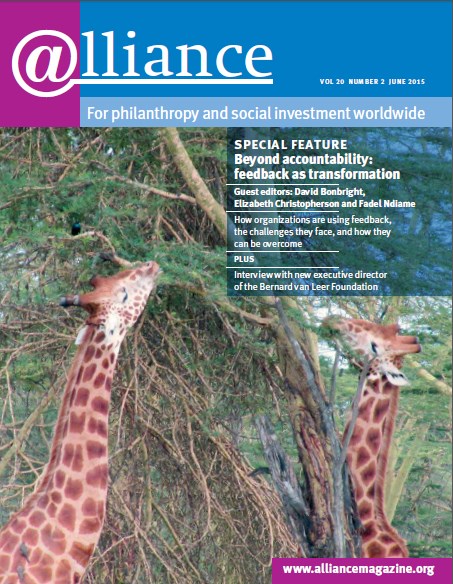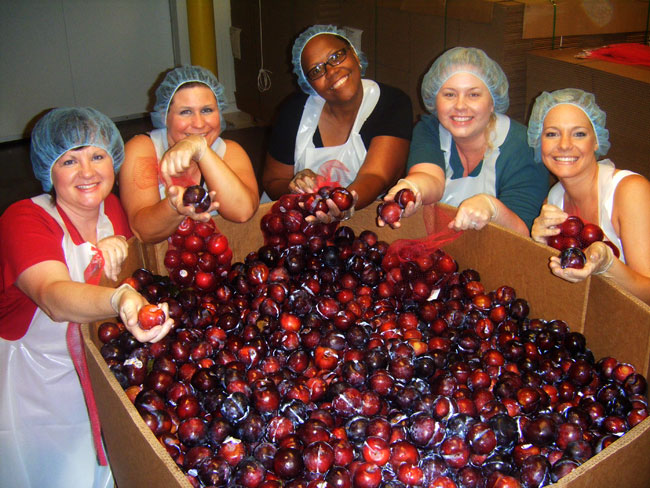‘We believe that listening to beneficiaries is both the right and the smart thing to do.’[1]
This statement perfectly encapsulates the philosophy underpinning the work of the Fund for Shared Insight (‘Shared Insight’). Shared Insight is a new funder collaborative comprising seven founding funders including the Packard, Ford, JPB, Rita Allen, Hewlett and Kellogg Foundations and Liquidnet. It seeks to improve philanthropy by increasing foundation openness to hearing from the people we seek to help, acting on what we hear, and sharing what we learn. We believe that listening to others, including our grantees, the people who benefit from the work of grantees, and other funders, is the right thing to do. We believe being responsive to what we hear, and sharing how we’ve changed what we do based on that feedback – also known as ‘closing the feedback loop’ – is the smart thing to do as it will result in more effective philanthropy.
One of Shared Insight’s inaugural grantees, Urban Institute with Feeding America, hopes to improve its services to food insecure individuals who use its network of 200 food banks and 48,000 member agencies around the country. For many years, the Mid-Ohio Food Bank incorrectly assumed that the people they serve did not want fresh fruits and vegetables as they rarely chose fresh produce when offered it. After conducting over 1,000 one-on-one interviews with their clients, they learned that member agency rules which allowed people to pick up food only once a month drove their selection of non-perishable goods. When agencies changed their policy to allow clients to select food once a week, they found a significant increase in requests for fresh produce. At one pantry, requests for fresh produce increased from half a dozen to over 500 requests per month.
This is just one example of how we at Shared Insight hope to support non-profits in their efforts to listen to those we seek to help, improve their programmes based on that feedback, and drive better outcomes. Our 2014 grants include efforts to hear from a wide variety of populations whose voices are not often heard, including foster youth, individuals coming out of the prison system served by the Center for Employment Opportunities (CEO), students sharing their perspectives in schools across the country through YouthTruth, and residents working with Habitat for Humanity International to revitalize their neighbourhoods.
We are also funding research to test various methods of collecting feedback from the individuals served by non-profits, including iPad technology, text messaging, phone surveys, Instagram, Facebook, focus groups and one-on-one conversations to see which methods produce the highest response rates for different populations. We aim to support efforts to collect systematic, ongoing feedback data, and generate comparable data, perhaps by industry and/or population served.
‘NPS is focused on a single ‘ultimate’ question: ‘How likely would you be to refer a friend to use our company/service/product?’
As we at Shared Insight consider how we will build on our year one investments and enhance our learning in year two, one of our emerging ideas is to fund research to develop a simple, low-cost approach to collecting feedback that smaller non-profits might test, perhaps in partnership with their funders. We are intrigued by the concept of developing some version of the Net Promoter Score (NPS) for non-profits. In recent years, NPS has taken off in customer-focused for-profit companies. NPS is focused on a single ‘ultimate’ question: ‘How likely would you be to refer a friend to use our company/service/product?’ and captures customer attitudes about a service experience or product. NPS has proved to reliably predict future company growth and performance. We look forward to building on the work our current grantees CEO, Feedback Labs, GlobalGiving, Keystone Accountability and LIFT are already doing to test NPS both here in the US and internationally.
Over the next two years, we hope and expect to find variations of ‘ultimate questions’ beyond the NPS that serve as useful leading indicators of the longer-term outcomes we seek. We may discover that NPS questions vary depending on the population and issue area and confirm that benchmarking within issue areas is possible in the non-profit sector. Or we may learn there is no single question or set of questions that can serve as predictors for positive future outcomes within specific issue areas and that benchmarking is impractical and inadvisable. Regardless, we hope to foster increased dialogue about the value of hearing from the people we seek to help, and sharing what we learn along the way.
Melinda Tuan is project manager for the Fund for Shared Insight. Email melinda@fundforsharedinsight.org
Footnotes
- ^ Fay Twersky, Phil Buchanan and Valerie Threlfall, ’Listening to those who matter most, the beneficiaries’, Stanford Social Innovation Review, Spring 2013.








Comments (1)
Dear Melinda, Very inspiring! Thanks Melinda for sharing article. May we respectfully share local initiative advocating local action as forum page at https://www.facebook.com/groups/southernleyteaction2020/. It is really very difficult to attract support, gain partnership and collaboration among local stakeholders especially when there is no funds set for the program. As in our case. But, only through this, we'll find sincere commitments and dedicated support from local actors and prospective partners. Respectfully inviting you to visit group and begin what matter most, listening. Thank you. Sincerely, Nelson